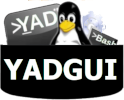Installing Latest version of YAD on Debian Linux -
This website will serve as a collection point for all things YAD.The YAD package is located in some Linux repositories, however, they all are older versions of YAD. Currently, (2022/August) Debian stretch still maintains YAD version 0.40.0 (without webkit / --html option) while the current version of YAD by the Author (Victor Ananjevsky) is: YAD Version 12.0. So, in the case of Debian, one would need to compile (Most Secure Option) YAD on their computer. Currently, only x64 cpu is supported.
Debian *.deb file (not part of this install procedure - just info about them)
Concerning yad*.deb installable files. They are:
1. Version & option specific (yad version & yad option specific as compiled); and
2. cpu type specific as well (64 bit or 32 bit for AMD & Intel cpu chips).
Install yad on Ubuntu 24.04 (Lubuntu / Xbuntu)
Install Ubuntu backports - Jammy using this command:
sudo add-apt-repository -y "deb http://gb.archive.ubuntu.com/ubuntu jammy main"
Then follow below instrutions
Raspberry Pi
Concerning Raspberry Pi OS (not light version). Raspberry Pi OS is Debian based and the below procedure should work to install yad on a Raspberry Pi 3/4
Source & Install YAD - Debian
Below are procedures to prepare your Linux; then obtain and install YAD version 1.0 - 12.0 for Debian Linux which includes Ubuntu, Q4OS, Sparky Linux, AntiX, and many more OS's that are Debian Based.
Summary:
- Obtain Source code.
- Install the Dependicy apps / libraries needed for Compiling yad .
- Install YAD specific Dependicies
- Decompress official yad source code
- Compile yad from official yad source code.
- Make the yad installer
- Install YAD (yad 1.0 and above are installed in /usr/local/bin )
- Update the gtk icon cache runin terminal: gtk-update-icon-cache
- If you wil be using my YADGUI scripts you will also need duplicate the yad compiled executable file to yad2 yad3 yad4
To copy yad to yad2,3,4 in terminal run this commands: (verifty yad is installed in /usr/local/bin and correct version, 1.x +)
cd /usr/local/bin
sudo -s
./yad --about
cp ./yad ./yad2
cp ./yad ./yad3
cp ./yad ./yad4
--------------------------------
Obtain Source Code
You should only obtain the YAD Source code from its Author's official Repsitory which resides on Github. https://github.com/v1cont/yad/releaseshttps://github.com/v1cont/yad/releases
If your are new to Linux, I suggest that you download the Yad*.zip file.
Decompress Source Code -
Decompress Source code to a folder on the computer for which you will be compiling and installing YAD.
Terminal Method - (Commands are after -> arrow)
1. Open terminal (From Desktop you can use ctrl+t)
2. Decompress Yad Source code:
"Change to directory that contains the yad*.zip file", for example: -> cd Downloads (on my pc for example its -> cd /home/linux/Downloads)
"unzip the yad*.zip file" -> unzip ./yad*.zip
3. Install Compile Specific Dependices:
-
sudo apt-get update -
sudo apt-get upgrade -
sudo apt-get install automake build-essential intltool libglib2.0-dev libgtk-3-dev -
Also, verify you have these plugins, at very least gstreamer1.0-plugins-good & gstreamer1.0-libav
-> sudo apt-get install gstreamer1.0-libav
-> sudo apt-get install gstreamer1.0-plugins-good gstreamer1.0-plugins-bad
4. Install YAD Specific Dependies: (for "--html --browser" functionality)
sudo apt-get install libwebkit2gtk-4.0 libwebkit2gtk-4.0-dev
---------------------------
(Updated: 9-18-22: If you are going to compile yad with text-info box script hightlighting option, --sourceview | then install these:)
-> sudo apt-get install libgtksourceview-3.0-1 libgtksourceview-3.0-common libgtksourceview-3.0-dev
----------------------------
cd yad-12.0 # or whatever yad* folder was created by unzipping
sudo -s-
autoreconf -ivf && intltoolize
./configure --enable-html --enable-sourceview
make
make install
exit
gtk-update-icon-cache
DONE ! - Test yad. in terminal type ->
yad --about
# it should show show:
Built with Webkit
Built with GtkSourceView
Using GTK+ 3.24.27
---------------------------------
For successfully build you may also need to install the following package:
-
- GTK+ >= 3.22.0 (http://www.gtk.org) with appropriate -dev packages depending on your distro
Additionally, you can build yad with the following libraries:
-
- Webkit - for supporting HTML dialog (http://webkitgtk.org) (Accomplished in step 4. above)
- GtkSourceView - for enabling syntax highlighting in text-info dialog (https://wiki.gnome.org/Projects/GtkSourceView)
- GSpell - for support spell checking in text fields (https://wiki.gnome.org/Projects/gspell)
In standalone build (configure option --enable-standalone) For Example in Step 5. above -> ./configure --enable-standalone --enable-html
Note: Standalone build must be used on computers that have the same cpu type as origially compiled. Compiled for x64 will NOT work on a 32 bit cpu type.

